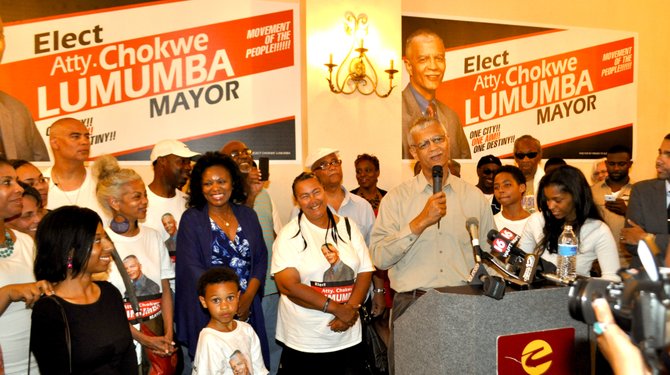City Councilman Chokwe Lumumba used a grassroots effort to get out the vote Tuesday May 21. He received more than 20,000 votes in the Democratic primary runoff out of 37,283 total ballots cast. Photo by Trip Burns
Chokwe Lumumba doesn't want any person or business to leave Jackson just because he will probably be the city's next mayor.
But don't expect him to beg.
"Well, we won't be begging anybody to do anything. I think that principled people are going to give it a shot, and I think the majority of the people are principled," he told the Jackson Free Press on Memorial Day.
"Few people are going to leave Jackson that weren't on a path to leave Jackson in the first place. And anybody that does leave Jackson is making a mistake because this city is on its way up. This is a very important city. We're in a good position to start moving in a good direction, so I would urge everybody to stay, and I would urge everybody to pitch in."
Lumumba's victory in the May 21 Democratic runoff touched off social-media hysteria reminiscent of President Barack Obama's election and re-election. Some Jackson supporters of Lumumba's rival, businessman Jonathan Lee, and many whites in non-Jackson locales around the state wrote off the results as suggestive of a black electorate too ignorant to recognize that Lumumba would drive off the minority of white home and business owners who bear the burden of supporting the local economy.
Those suspicions, that Lumumba harbors anti-white hostilities, go back to his affiliation with the Republic of New Afrika, which bought land in Mississippi for a black-led nation in the 1970s, as well as his history of picking fights with what he would consider racist institutions, such as the courts, to say nothing of the adoption of an unusual and foreign-sounding name. Lumumba's opponents tried unsuccessfully to play on these fears and raise doubt in the minds of mainstream Jackson voters likely to vote in a municipal primary election.
Lumumba says the notion that he is divisive is erroneous.
"There may be some people who have misperceptions based upon some attitudes which aren't justified, and they may have a long-standing, long-running objection, but that's something we aren't going to be worried about. We're certainly always going to leave the door of the ship open for people to come on board, but we're not going to hold the ship back waiting for folks who have unfounded resentments to come around," he said.
Lumumba, 65, seemed especially agitated by what he called "absurd" comparisons between himself and Ross Barnett, the former Mississippi governor and namesake for a popular local tourist destination who expanded the powers of the Mississippi Sovereignty Commission, a state-sponsored spy agency, during the civil rights era.
"In no instance I'm aware of has anybody accused me of oppressing or suppressing somebody else's rights. I don't do that. I don't intend to do that. I never will do that. I think it's contradictory to what I'm fighting for. I'm fighting for a better society, not a worse one. I'm not trying to flip the script on anybody," Lumumba said.
Still, he knows he has his work cut out for him when it comes to unifying Jackson. For that, he has a simple plan: launch a citywide cleanup program and commence with street reconstruction. During the campaign, many voters ranked the condition of Jackson's streets and blight as among their top concerns, and Lumumba believes these issues transcend race and ward.
Lumumba also has started a sort of listening tour designed to take him outside the usual circles he normally travels in. On May 26, he attended services at First Baptist Church in downtown Jackson and has visited dining establishments owned by restaurateur and Jonathan Lee booster Jeff Good in effort to support businesses he believes are "showing loyalty to the city."
Convincing naysayers, particularly those dubious of Lumumba's past race-laced rhetoric, will be difficult, but the prominence of race issues in politics did not start during the 2013 Jackson mayor's race.
"The electorate in Mississippi has been polarized along the lines of race since emancipation. This is not a new phenomenon. Our history of politics has always been predicated by race," said Robert Luckett, director of the Margaret Walker Alexander National Research Center at Jackson State University and a professor of civil-rights and southern history.
Luckett believes the handwringing over Lumumba's election is probably unwarranted, noting that during Lumumba's time in city government, he has worked side-by-side with two white council members--Republican Quentin Whitwell of Ward 1 and Democrat Margaret Barrett-Simon of Ward 7--and has maintained professional relationships with both members.
Lumumba said he would also like some help from rank-and-file Jacksonians. He's confident that success in the early days of his administration will breed greater acceptance of his agenda. In the meantime, Jackson residents need to take responsibility for the city's future.
"You're going to hear me doing a lot of stuff about taking responsibility. I'm not going to be content with people just standing by the wayside being observers of history. They'll need to be makers of history," he said.
Tyler Cleveland contributed to this story.



Comments